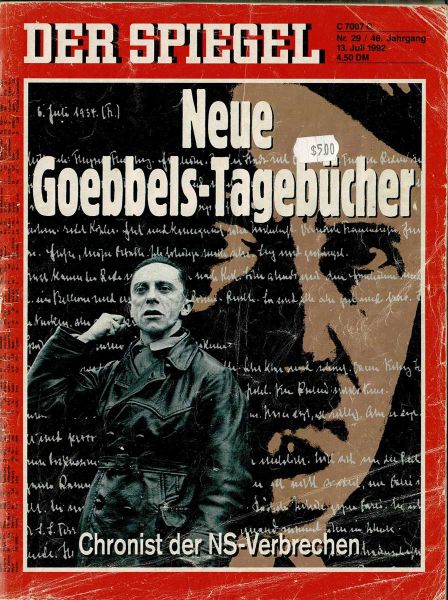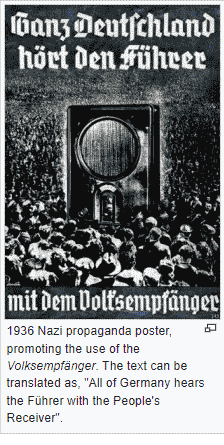The Role of Resentment II
THE ROLE OF RESENTMENT II
The Nazis have always interested me, for their ability to undermine German faith in representative government. The Nazi administration covered all the bases of a dictatorial leadership brilliantly, so that future dictators, and even Soviet Premier Joseph Stalin expressed their admiration of the Nazis. Heinrich Himmler covered the security for the Nazi-state brilliantly and ruthlessly. The "Führer," Hitler, directed military campaigns, while Joseph Goebbels distringuished himself as propaganda-chief, the manipulator of German public opinion.
But Hitler, for all his evangelical histrionics, had a limited role, beyond the public face of Nazism and rarely appeared in public after the disasters in Russia. Himmler, for all his cruelty, remained the chief bureaucrat of the administration. Neither of them had much of a life outside their public roles. Goebbels, on the other hand, maintained an interest in literature and music throughout his life, and is easily the most interesting of the Nazi leaders.
Even among his associates, Hitler rarely talked in personal terms, and none of his associates knew him well. When not planning military campaigns, he spoke in slogans or diatribes. Himmler spoke or wrote like an administrator. His correspondence, for instance, shows ability and polish, but with officiousness and no personal touches.
Goebbels, on the other hand, showed not only great ability in his role as a spokesman for the Nazi regime, but also his interest in literature and music. Word of his rooster-like personal character, his arrogance, and his infidelities also leaked out into the foreign press-corps, but of course, they could not report anything about it. The press-corps, at any rate, heard from other leading Nazis how much they detested Goebbels.
As the Soviet Army neared Berlin, however, Goebbels feared capture. More than that, he feared the Soviets' dishonoring his human remains; so he cajoled his wife into murdering their children, then killing themselves, and instructing their subordinates to incinerate their bodies. When the Russians finally took possession of the Nazi Reichsbunker, they found the Goebbels' charred remains. I have heard the rumors about Adolf Hitler escaping to South America. The only thing that convinces me that the Führer died in the Reichsbunker is Goebbels's own death. If Hitler had planned to escape, Goebbels would have gone with him.
Then news about diaries that Goebbels had compiled over the years surfaced. American researchers found a typewritten copy of his diary in the rubble of the Propaganda Ministry building. Later, the Soviets admitted that they had found his handwritten personal diaries and taken them to Russia for safe-keeping. Goebbels kept a handwritten copy and also a copy on microfilm. The Soviets never bothered to study the diaries, but filed them away in their historical archives, where they remained undisturbed until 1992, when a German researcher discovered them.
Now anyone can purchase a copy of the diaries, in both English and German. Reviewers have made mostly predictable comments about Goebbels's anti-semitism, his abject admiration for Hitler, his loathing of the Soviet Union, and his zest for outlawing dissident groups and political parties; but the diaries reveal Goebbels at his most personal level. He describes the diaries as his "Beichtvater," German for "Father-confessor."
The German news-magazine Der Spiegel read the diaries and published several articles about them. The first, published in September, 1987, had the title "Meine Waffe heißt Adolf Hitler!" In English, it reads, "My Weapon is Named Adolf Hitler." Not "my idol," or "my hero," but my weapon—and not Hitler wielding Goebbels, but Goebbels wielding Hitler, and for why?
"Revenge!" Goebbels snarls. "Who cares for what reason." But he wants revenge for himself—for his "oversized head and club-foot." He claims utter faith in the Nazi cause and its philosophy about Nordic superiority; but he also admits to being a "Demagoge, schlimmster Sorte." A demagogue of the worst sort. He also describes himself as a "Canaille," a European literary word for "scoundrel."
And he does not merely use Hitler for his own purposes. He also reveals his true feelings about the average German citizen—that "weak, lazy, and cowardly Volk." He also had little regard for Nazi leadership, whom he described as "the ruling bandits."
Goebbels also makes no secret of his striving for power: "The more power I imagine my Führer to have, the more majestic I will become." But his nihilism surprises me the most. Goebbels describes himself laughing with glee at the "destruction of everything holy and civil."
Finally, Goebbels understands the best way to convey Nazi ideology to the lazy German populace: broadcasting. "Every German home shall have a radio," he says. Goebbels will use broadcasting to "dumb down the German people." He describes it as "the spiritual weapon of the totalitarian state. Every German home will have a radio." With it, the Nazis can "disseminate the Nazi indoctrination continuously." Goebbels writes that he will make radio-broadcasts "an emotional roller-coaster; one moment, shrill pathos, the next open threats, followed by heavenly promises—brainwashing by the millions."
I thought about that in light of America's own media monoliths—battling each other every night for the hearts and minds of the American people, one cable-network ostensibly Republican, the other Democrat. We get continuous indoctrination from them, our own emotional roller-coaster. Is it any wonder that doctors prescribe anti-depressants so often in this country?
How long do we want to tolerate the cold-war conditions in this country? When will an enterprising politician say, "Republicans need their own country"? He could float the proposal with the best lure available, the best anti-depressant money can buy--independence and peace of mind!


